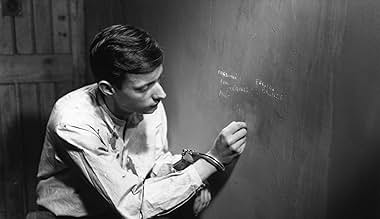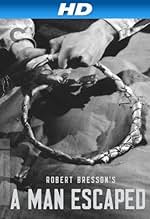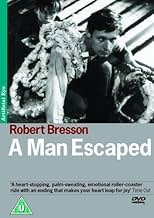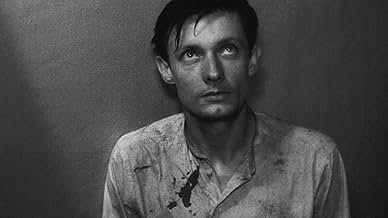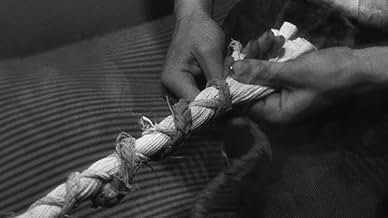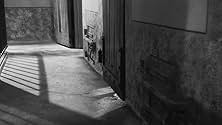Un condamné à mort s'est échappé ou Le vent souffle où il veut
- 1956
- Tous publics
- 1h 41min
NOTE IMDb
8,2/10
29 k
MA NOTE
Conduit en 1943 au fort de Montluc pour y être exécuté par les Allemands, le lieutenant Fontaine parvient à s'échapper en compagnie d'un autre prisonnier, Jost.Conduit en 1943 au fort de Montluc pour y être exécuté par les Allemands, le lieutenant Fontaine parvient à s'échapper en compagnie d'un autre prisonnier, Jost.Conduit en 1943 au fort de Montluc pour y être exécuté par les Allemands, le lieutenant Fontaine parvient à s'échapper en compagnie d'un autre prisonnier, Jost.
- Réalisation
- Scénario
- Casting principal
- Nomination aux 1 BAFTA Award
- 4 victoires et 3 nominations au total
César Gattegno
- Le prisonnier X
- (non crédité)
Max Schoendorff
- Un soldat allemand
- (non crédité)
Résumé
Reviewers say 'A Man Escaped' is lauded for its minimalist style and intense focus on escape from a Nazi prison. Bresson's direction, sparse dialogue, and use of non-professional actors are praised. The deliberate pacing builds suspense and immerses viewers. Some appreciate its authenticity, while others find it less engaging. Leterrien's performance is noted for realism, but opinions vary on its accessibility and emotional impact.
Avis à la une
Though the title seems to ruin the ending, the movie isn't boring for a moment. Suspense to the end. Marvelous filmmaking. The movie follows slowly and quietly the day of the prisoner who's to be executed and plans an escape. I don't know what else to say. You have to watch this. 32 of the 46 voters gave it a 10! Genius. They don't make movies like this often. Must See for movie lovers and all.
10allyjack
Was there ever a sparer, more concentrated film? The painstaking focus on the ritual-like preparation for the escape is almost wrenching in its calm severity; yet always graceful, always fluid. The details of the final escape make for one of the most memorable sequences in cinema - interspersed with episodes of doubt in which he falters for hours or more before taking the next step, just as he delays the escape itself for many days even though he knows his execution is imminent. It's almost like a sombre dance with death, or at least a morally exacting examination of one's limits and a fear of the transcendent (which in this case is represented merely by freedom itself). There are no moments of light relief or variation here, just an attention to process and causality - the concentration on the plan almost becomes a means of redemption, until carrying out the plan becomes almost superfluous if not destructive. Of all Bresson's films, this is the one that best engages on a thematic level while simultaneously working as narrative - his distilled gravity constitutes a fantastically effective suspense mechanism; a model of tight storytelling.
The stoically minimized material, a man's precisely prepared, calculated, and then executed escape from a Nazi-prison, effectively builds up an astonishingly intense tension. (For that matter, only similar film I can recall is Cluzot's Wages of Fear, made a couple of years earlier.) In this very quiet A Man Escaped, only music is sporadically inserted Mozart, but it might have worked better without any music.
Bresson audaciously began realism and stood alone in pre-New-Wave France, but left tremendous influences on generations of filmmakers to come.
Bresson audaciously began realism and stood alone in pre-New-Wave France, but left tremendous influences on generations of filmmakers to come.
Bresson's command of the cinematic language...and more importantly, his restraint... make this a very powerful story of one man's determination to find meaning in his actions, focused goal, and adherence to his beliefs.
Presumably tipping off the viewer with the title (A Man Escaped) we already suspect how it will end, and therefore the tension isn't in the final twists of the story, but rather, his journey to that place.
Narrative stripped down of all melodramatic trappings, the film manages to reveal a larger truth about man's struggle against unknowable odds, his struggle with himself, and his resolve to move forward. A couple of the side-characters are from the church, or pastors, which give the ongoing conversations in the common areas an added resonance to "grace" and a possibility of transcendental deliverance. Even though the lead character doesn't seem to truck much with religious faith.
He has his own - in his resolve to escape.
It's appropriate that we barely know why the lead character is in prison, only that he is already on the way there when the film starts. (And even then, tries a failed attempt to run from the car that is transporting him. So much for back-story. The character is revealed through his subsequent actions.)
A simple beautiful film focused on humanity at its most desperate, spare, and focused.
Presumably tipping off the viewer with the title (A Man Escaped) we already suspect how it will end, and therefore the tension isn't in the final twists of the story, but rather, his journey to that place.
Narrative stripped down of all melodramatic trappings, the film manages to reveal a larger truth about man's struggle against unknowable odds, his struggle with himself, and his resolve to move forward. A couple of the side-characters are from the church, or pastors, which give the ongoing conversations in the common areas an added resonance to "grace" and a possibility of transcendental deliverance. Even though the lead character doesn't seem to truck much with religious faith.
He has his own - in his resolve to escape.
It's appropriate that we barely know why the lead character is in prison, only that he is already on the way there when the film starts. (And even then, tries a failed attempt to run from the car that is transporting him. So much for back-story. The character is revealed through his subsequent actions.)
A simple beautiful film focused on humanity at its most desperate, spare, and focused.
A MAN ESCAPED is a great war drama about despair and unbearable circumstances from which a man tries to escape. The main protagonist is an activist of the resistance movement. He was arrested after one action. After the initial shock, the young man begins to plan an escape from prison, and he moves in a race against time because his enemies threaten him with liquidation.
The story is honest and realistic in many segments. The plot is, if we ignore the mystical introduction, very simple. Scenery is confined to a very small space, which directly contributes to an increased sense of fear, despair and anxiety of the main character. Mr. Bresson made the film without specific decorations, classic turnaround and growing tensions. Simply, the focus is on the prisoner who tried to escape. The plot is realistic and spontaneous. One young man must choose between life and certain death. He was on his own in the inner monologue on the difficult road to knowledge.
François Leterrier as Lieutenant Fontaine is calm and dedicated to the inner struggle. His performance is impressive. It's hard to believe that he is not a professional actor. His appearance is unreal and convincing. This is evident in his haggard and engrossed face, bloody shirt and torn stockings.
This film is a reflection of a cruel experience. One man in a desperate, depressed and uncertain fight for his life, or perhaps some form of redemption.
The story is honest and realistic in many segments. The plot is, if we ignore the mystical introduction, very simple. Scenery is confined to a very small space, which directly contributes to an increased sense of fear, despair and anxiety of the main character. Mr. Bresson made the film without specific decorations, classic turnaround and growing tensions. Simply, the focus is on the prisoner who tried to escape. The plot is realistic and spontaneous. One young man must choose between life and certain death. He was on his own in the inner monologue on the difficult road to knowledge.
François Leterrier as Lieutenant Fontaine is calm and dedicated to the inner struggle. His performance is impressive. It's hard to believe that he is not a professional actor. His appearance is unreal and convincing. This is evident in his haggard and engrossed face, bloody shirt and torn stockings.
This film is a reflection of a cruel experience. One man in a desperate, depressed and uncertain fight for his life, or perhaps some form of redemption.
Le saviez-vous
- AnecdotesAfter seeing the film, Jean-Luc Godard said that Robert Bresson was "to French cinema what Wolfgang Amadeus Mozart is to German music and Fyodor Dostoevsky is to Russian literature".
- Citations
Le lieutenant Fontaine: I think my courage abandoned me for a moment and I cried.
- Versions alternativesAfter the "Fin" title card, there is a version that plays music to a black screen, while another version displays "Exit Music" in white letters against the black screen.
- ConnexionsFeatured in De weg naar Bresson (1984)
- Bandes originalesGreat Mass in C Minor, No.16 (K.427) - Kyrie
Written by Wolfgang Amadeus Mozart
Meilleurs choix
Connectez-vous pour évaluer et suivre la liste de favoris afin de recevoir des recommandations personnalisées
- How long is A Man Escaped?Alimenté par Alexa
Détails
- Date de sortie
- Pays d’origine
- Langues
- Aussi connu sous le nom de
- Le vent souffle où il veut
- Lieux de tournage
- Sociétés de production
- Voir plus de crédits d'entreprise sur IMDbPro
- Durée1 heure 41 minutes
- Couleur
- Rapport de forme
- 1.37 : 1
Contribuer à cette page
Suggérer une modification ou ajouter du contenu manquant

Lacune principale
What is the Japanese language plot outline for Un condamné à mort s'est échappé ou Le vent souffle où il veut (1956)?
Répondre

